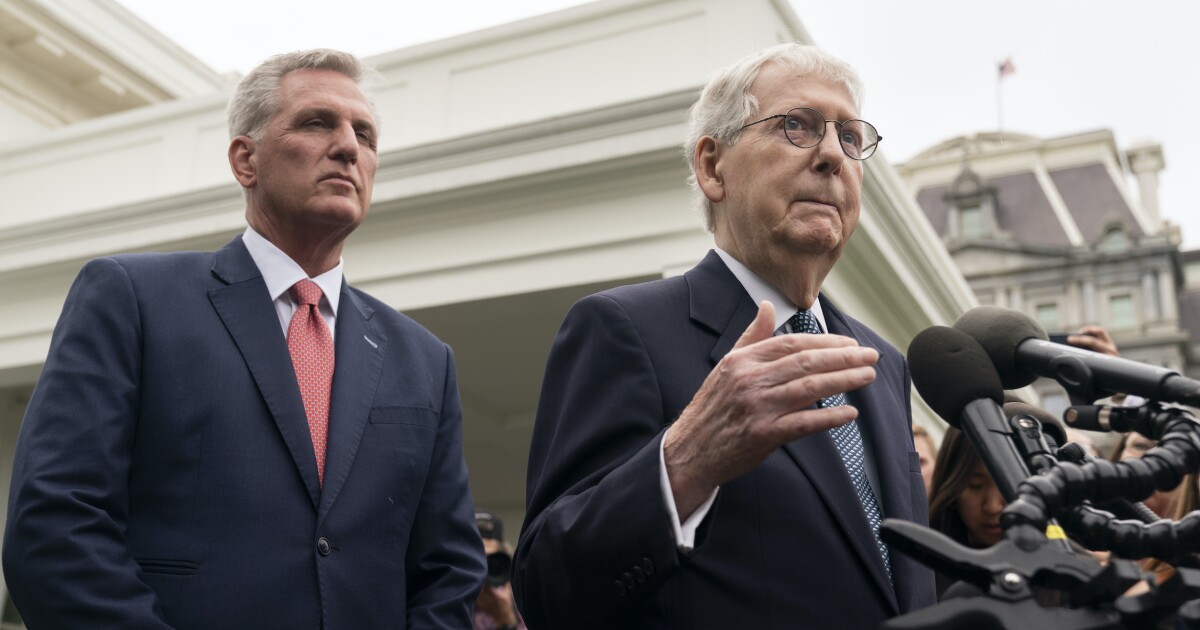

The GOP unity seen in the debt ceiling fight is giving way to a House vs. Senate divide over defense as Congress shifts its attention to funding the government later this year.
Senate Republicans relegated themselves to the sidelines in the standoff over the federal borrowing limit, choosing to let Speaker Kevin McCarthy (R-CA) drive GOP demands for spending cuts. The speak-with-one-voice playbook helped get President Joe Biden to the negotiating table and broker a deal.
INFLATION ISSUE STILL LOOMS FOR BIDEN DESPITE PROGRESS
Yet many of those Senate Republicans soured on the compromise that eventually emerged. McCarthy essentially spared the Pentagon from the modest cuts agreed to elsewhere in the discretionary budget. Instead, Congress would increase defense by 3% next year, the amount called for in the president’s 2024 budget.
That $886 billion figure, however, amounted to a cut when adjusted for inflation. What’s more, if Congress failed to pass all 12 appropriations bills, the legislation mandated that the entire discretionary budget, defense and domestic programs alike, be cut by 1%.
Defense hawks cried foul over the compromise, pressing Senate leadership to work around the budget caps with a supplemental aid package for Ukraine later this year. Without one, they would obstruct passage of the deal with only days left before the country defaulted.
Majority Leader Chuck Schumer (D-NY) and Minority Leader Mitch McConnell (R-KY) agreed to the side deal, clearing the way for the debt ceiling bill to become law.
But McCarthy on Monday poured cold water on the Senate’s hopes of new aid.
Congress would have to abide by the caps laid out in the compromise, he said. If defense hawks wanted more money for Ukraine, they’d have to work through, not around, the appropriations process.
“The way I take that is, you’re trying to work around the agreement we just created, so I am opposed to that,” McCarthy told Bloomberg. “We haven’t even gone through NDAA. We haven’t gone through approps, DOD.”
Squabbling over the defense budget is a common feature of Washington politics. But it’s one typically fought between Republicans and Democrats.
Democrats are satisfied to work with Biden’s top-line figure as they craft a budget ahead of an Oct. 1 deadline to fund the government.
But a promise McCarthy made to his right flank to pursue deep spending cuts threatens to tear Republicans in the two chambers apart.
Aid for Ukraine isn’t controversial in and of itself. In fact, it’s a rare area of bipartisanship on Capitol Hill, including in the House. Washington has allocated some $110 billion in economic and military aid since the Russian invasion last year.
As Ukraine mounts a long-anticipated counteroffensive that could turn the tide in the war, lawmakers generally expect that more funding will be needed at some point.
But McCarthy, controlling the House with a four-seat majority, is under incredible pressure to reflect the views of fiscal hawks and Ukraine aid skeptics in his conference.
The speaker is already in hot water with the Freedom Caucus for brokering with the White House spending cuts that fell trillions short of the demands they were seeking.
The size of Democratic support for the debt ceiling deal even led to talk of holding a “no confidence” vote on his speakership. That anger boiled over on Tuesday after a dozen conservatives tanked a GOP messaging bill in retaliation for the debt limit compromise.
McCarthy has sought to mend fences with the hard-liners with a pivot to red meat issues such as holding FBI Director Christopher Wray in contempt of Congress.
But how he handles the appropriations process later this year will have just as big an impact on his job security.
Moreover, some of the same lawmakers demanding that he rein in Washington spending are wary of the seemingly unlimited amount of money being dedicated to Ukraine’s war effort.
The money has been effective in eroding Russia’s land forces — upward of 20,000 Russian soldiers have died since December, according to U.S. estimates.
But challenging America’s longtime adversary must be counterbalanced with audits of where the money has gone, aid skeptics say. Some want the United States to remove itself from the conflict entirely.
McCarthy declared on Monday that he is a defense hawk, but he’s made overtures to more dovish members in the past. He famously made waves for saying Ukraine won’t have a “blank check” from the U.S.
The view stands in stark contrast to senators like Lindsey Graham (R-SC), who is already promising to wage a fight over the supplemental.
McConnell, the GOP’s most powerful voice for Ukraine aid in the Senate, called the $886 billion in defense spending “simply insufficient” in a floor speech on Tuesday, doubling down just hours after McCarthy rebuffed the Senate’s commitment.
McCarthy, for his part, rejects the idea that the national security challenges the U.S. faces abroad means defense spending should be exempt from the scrutiny Republicans give to other parts of the budget.
“I mean, Lindsey wants to spend money on every war in the world,” McCarthy told reporters. “Show me why I’m spending money. You’ve got to win the argument.”
“The point I’m trying to make to people is if you want to spend money anywhere, tell me the purpose why, tell me what you want to achieve, and then we’ll decide then if it’s worthy of spending taxpayer money,” he added.
The GOP split was illustrated in the way Republicans ultimately voted for the debt ceiling legislation. McCarthy was able to deliver two-thirds of his conference to vote for the bill, a level of support he promised Minority Leader Hakeem Jeffries (D-NY).
But Senate Republicans largely voted against the measure as defense hawks joined with fiscal conservatives to vote “no.”
Should a Ukraine aid supplemental be considered later this year, McCarthy ally Dusty Johnson (R-SD) suggested its passage could come down to how bloated it becomes. Graham hopes to tack on defense priorities unrelated to Ukraine, arguing the threat of China is too great not to.
But a bare-bones supplemental might stand a better chance.
CLICK HERE TO READ MORE FROM THE WASHINGTON EXAMINER
“I think there will be people who are supportive of funding Ukraine who would not be supportive of a supplemental. I don’t know how many that’ll be, but I do think that we’re in an environment where I think people are going to try to put some downward pressure on spending,” Johnson told Punchbowl News.
“A supplemental that gets too big to take care of everything the defense hawks want,” he added, “is going to run into some roadblocks.”





